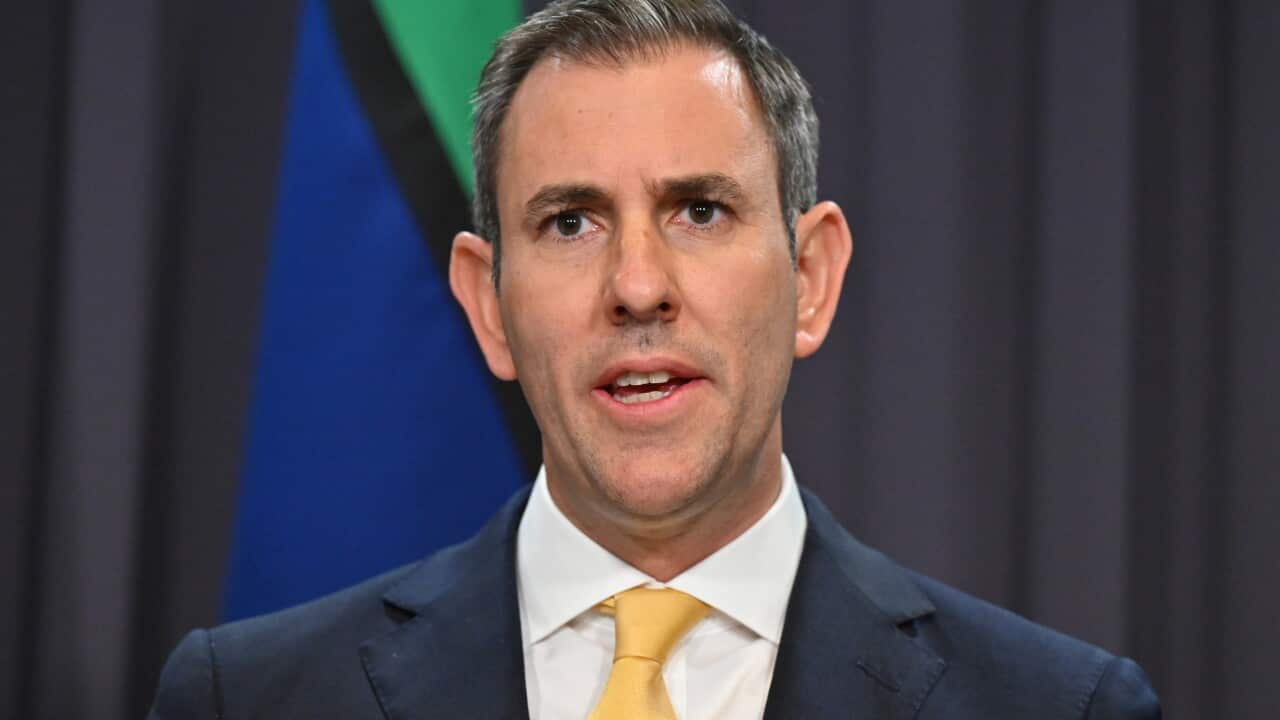Key Points
- Labor has delivered its first budget trying to keep spending down as it battles to slow the rising cost of living.
- Treasurer Jim Chalmers said Australia is confronting the prospect of a third global downturn in a decade and a half.
The Albanese government has delivered its first budget with a focus on keeping its spending down as it battles to keep the rising cost of living from getting worse.
"This is a responsible budget that is right for the times and readies us for the future," Treasurer Jim Chalmers said.
Mr Chalmers said Australia is confronting the prospect of a third global downturn in a decade and a half.
"This time not a financial crisis or a pandemic, but a war driving high prices and higher interest rates here and around the world, and the risk of another global recession," he said.
"This time demands a different response."
Mr Chalmers said the budget delivered on its election commitments including cheaper childcare, more paid parental leave, better access to health care, cheaper medicines and a better standard of aged care. It also provides fee-free TAFE and more university places.
to help businesses fill labour shortages, with the number of visas available increasing significantly from 79,600 to 142,400.
A new Pacific Engagement Visa will also be introduced, with up to 3,000 places available from next year for nationals of Pacific Island countries and Timor-Leste. This will be on top of the 195,000 available as part of the permanent program.
A national Housing Accord was announced that will see governments, investors and industry work together with a goal to build one million new homes over five years from 2024.
Funding of $75.1 million will also be provided for the referendum on the First Nations Voice to Parliament to be included in the Constitution. Another $5.8 million will go towards establishing an independent Makarrata Commission.
What's the good news?
Inflation can be good for the government, which gets extra taxes.
The deficit for 2022-23 is now forecast to be $36.9 billion, less than half of the $78 billion predicted in March.
The government said it had achieved this by taking the money it has received from higher commodity prices and employment, and putting this back into the budget, rather than spending it.
Even though debt will still reach a trillion dollars, it will be lower than previously forecast.
What's the bad news?
The threat of recessions globally, high inflation, cost of living pressures and higher interest rates are expected to slow growth in Australia to 1.5 per cent in 2023-24.
is expected to peak this year before reaching about 3.5 per cent by June 2024. Treasury assumes electricity prices will rise by an average of 20 per cent nationally in late 2022, with a further 30 per cent rise in 2023-24.
Unemployment is expected to increase to 4.5 per cent by the June quarter of 2024.
Australia's gross debt is expected to exceed a trillion dollars next year, and to continue to rise from there.
While the deficit is less than half what was previously expected this year, it will be larger than predicted in the next few years because of high interest payments (the fastest-growing area of spending), as well as the extra money needed for social programs such as the National Disability Insurance Scheme (NDIS).

Treasury predicts electricity prices will rise by 20 per cent this year, and another 30 per cent in 2023/24. Source: AAP / DAVID MARIUZ
When will wages grow?
Inflation is the economy's biggest enemy and is pushing up prices faster than wages can keep up.
It is expected to peak at 7.75 per cent late this year, before reaching about 3.5 per cent by June 2024.
This means most people won't feel like they are getting ahead until around 2024 or 2025.
Is there anything to ease cost of living pressures?
The price of food, electricity and petrol looks likely to continue rising.
The government said it doesn't want to make inflation even worse through its spending, which could just lead to more price hikes.
Instead, it said it will provide cheaper childcare, cheaper medicines, more affordable housing, expand paid parental leave, and is supporting wage rises for those on minimum and award wages, as well as for aged care workers.
What has the reaction been?
Opposition leader Peter Dutton said Labor's "high taxing, high spending budget does nothing to tackle the cost of living pressures affecting everyday Australians".
Mr Dutton, who will deliver his budget reply speech on Thursday, posted comments on his Facebook page on Tuesday night.
"Just before the election, the prime minister told Australians that they 'will be better off under a Labor government'," he wrote. "In fact, by Christmas, the average Australian family will be at least $2,000 worse off."
Nationals leader David Littleproud blamed the drastic increases in grocery bills on Labor's decision to scrap the agriculture visa.
"Supply has been slashed because farmers and processors are only working at around 60 per cent capacity, which has put prices up at the checkout," he said.
Mr Littleproud also pointed out the childcare measures didn't create extra spaces and did not leave regional or rural families better off, saying affordability was not the main issue for regional families, accessibility was.
He said the scrapping of $4.6 billion in dam funding as well as other funding had "ripped the guts out of regional and rural Australia".

Opposition Leader Peter Dutton and Nationals Leader David Littleproud have criticised the budget for not improving cost of living pressures.
"We remain deeply concerned about the lack of action to lift the incomes of people living on payments like JobSeeker, which is just $48 a day," ACOSS CEO Cassandra Goldie said in a statement.
"There are over three million people living in poverty, with many on JobSeeker and Youth Allowance forced to skip meals and essential medication, and live in their cars."
Ms Goldie said people on the lowest incomes need an urgent increase in support.
"People on the lowest incomes face multiple crises including high inflation, 150,000 more people unemployed in 2023, rents up 10 per cent in just one year, high debt as well as multiple disasters," she said.
"So, this must be the beginning and not the end of the hard work this government must do. We must see an urgent increase in income support for people on the lowest incomes in Australia."
The United Workers Union (UWU) welcomed the budget's focus on working women.
"The federal government’s embrace of policy that benefits working women – including the commitment to 26 weeks of paid parental leave – is a marked contrast to the blokey neglect women suffered for years at the hands of the Coalition," UWU national president Jo Schofield said in a statement.
"In the predominantly-female aged care sector, the federal government is also leading the way with measures that make a meaningful difference to aged care workers' lives by addressing understaffing and promising to lift workers' pay.
"However United Workers Union members in other female-dominated care industries will want to understand how today's announcements will benefit them in sectors including early childhood education and care and disability support."
Additional reporting by Jessica Bahr.











